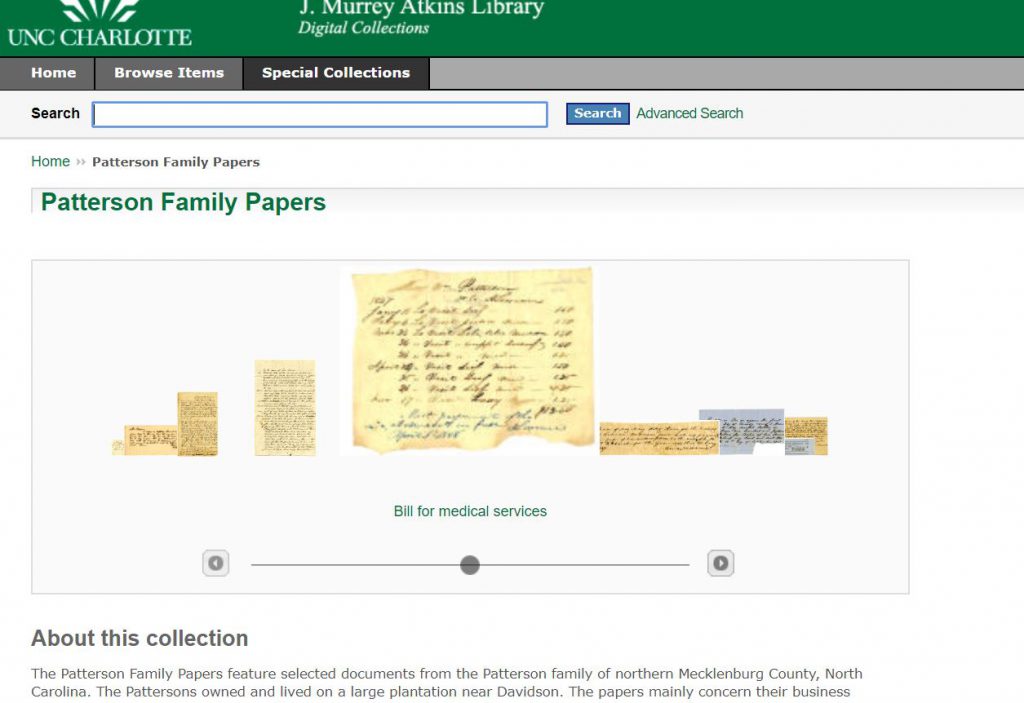After multiple class sessions introducing our archival and manuscript collections and oral history best practices, students in Dr. Nneka Dennie’s Spring 2019 AFR 329: Women & Slavery in the Black Atlantic course produced a documentary using oral histories created throughout the semester. These materials will be donated to the Archives.
In addition to this main project, students were tasked with identifying primary sources from local archives, historic sites, and/or repositories that shed light on the lived experiences of enslaved women or women enslavers. The following series of blog posts are authored by these students upon the completion of this archival research process and serve as reflective pieces.
Thank you for your submissions-and a wonderful semester of fruitful collaborations!
“Finding and Remembering: Black Women in the Archive”
written by Lindsey Jarrell
Studying Africana provides a deviation from other academic disciplines, it is a place where Blackness and Black experiences are centered, not a footnote on stories of white history and triumph. And yet, even in a discipline more soundly devoted to the lives and history of people of African descent throughout the diaspora, those scholars looking to study Black women still find themselves in a niche field.
Dr. Dennie’s Spring 2019 course Women and Slavery in the Black Atlantic allows students devoted to the study of Black women to spend a semester exploring different systems of slavery and the ways in which Black and white women lived and left records in those systems. Central to this course is our own exploration of the archives to attempt to find women’s voices and gain a deeper understanding of systems of enslavement in the Davidson and Charlotte areas.
The University of North Carolina at Charlotte has an extensive digital archive collection that is easily accessible to the public. In exploring these digitized records I was drawn to the extensive materials sorted as variations of “Family Papers”. Looking at the Patterson Family Papers, the collection which includes materials from 1761 to 1866, shows the family resided in northern Mecklenburg County where they owned a large plantation near Davidson. Within this collection are other notable Charlotte families who they conducted business with. Looking at the different documents one can see several bills of sale for the Black folx enslaved by the Pattersons and other families.
In 1825, 13 year-old Cheany was transferred from being the property of Elizabeth Potts to Edwin Potts. W.L. Davidson witnessed the sale which was for $400. In this document we can find evidence of a small fragment in the life or rather ownership of a young enslaved girl and the white woman who enslaved her. Later in the Patterson Family Papers the last will and testament of Elizabeth Potts can likewise be found. The document is signed and sealed November 30, 1859. Included in this document is which family members her enslaved were to be transferred to. None were freed. The names of the enslaved were not listed in the transcription and could not be made out in the scan. One of the enslaved was to be sent to Potts’s niece indicating the continuance of female enslavers in the Potts family.
While fragmented these documents can give us insight into the lives of enslaved women as well as white women who participated in the enslavement of Black folx and the managing of plantations as wives, widows, or by themselves. It may take digging to find but by following bills of sale, fugitive slave ads, wills, and more we can find documentation of multiple parts of enslaved people’s lives.
Following the example of scholars like Marisa Fuentes, Saidiya Hartman, and so many more we can take these fragments and attempt to give both voice and acknowledgement to the Black women in the archives who so rarely are remembered or considered. Such work must be mindful to not replicate the trauma of enslaved lives or to be overzealous in making assumptions about lives whose details we will never truly know. But when does with respect and diligence this work aids in creating a fuller understanding of the past which has created the structures of oppression that continue to affect marginalized folx, particularly Black women, today.


Speak Your Mind